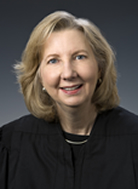NAWJ PRESIDENT DANA FABE SPEAKS OUT FOR MORE WOMEN ON STATES' COURT OF LAST RESORT
Written by National Association of Women Judges|November 01, 2009|News Archive
 In the wake of Pennsylvania fielding more women than ever on its ballot for judicial elections - one of the two people running for an open state Supreme Court is a woman, five of eight candidates for their Superior Court, the court one rung below the Supreme Court, three of four people running for Commonwealth Court, the other appellate court, and in Dauphin County three of the five candidates are women and the election for Lebanon County Common Pleas Court is between a man and a woman - NAWJ President Dana Fabe, who sits on Alaska's Supreme Court, formerly as its Chief Justice, while remarking on the progress made in advancing women onto the bench during the last 30 years, added that "progress has been much slower in promoting women to the states' appellate courts, particularly courts of last resort."
In the wake of Pennsylvania fielding more women than ever on its ballot for judicial elections - one of the two people running for an open state Supreme Court is a woman, five of eight candidates for their Superior Court, the court one rung below the Supreme Court, three of four people running for Commonwealth Court, the other appellate court, and in Dauphin County three of the five candidates are women and the election for Lebanon County Common Pleas Court is between a man and a woman - NAWJ President Dana Fabe, who sits on Alaska's Supreme Court, formerly as its Chief Justice, while remarking on the progress made in advancing women onto the bench during the last 30 years, added that "progress has been much slower in promoting women to the states' appellate courts, particularly courts of last resort."
The article on this trend, as reported in The Patriot News by Jeanette Krebs, though celebrating increased female participation reminded readers that "running for office and serving on the bench are two different things." Only two women have been elected to our highest state court. Joan Orie Melvin might be the third on Tuesday. Considering there are seven members on the court at any given time, that clearly does not reflect society or even the legal profession. This is true on a local level as well. According to the Pennsylvania Bar Association, 31 of the 67 counties have no women judges, concurs Lynn Marks, executive director of Pennsylvanians for Modern Courts.
Justice Fabe saluted exceptions Minnesota and Washington, which have in the past had a majority of women on their supreme courts, but added "most other states still are behind where they should be. Although it is heartening that we now have a substantial number of women chief justices throughout the country, there is still much work to do in ensuring that all levels of court, including our states' highest courts, reflect the diversity of the communities they serve," she said. Justice Fabe added that an important reason why judges should reflect the diversity of society as a whole is that "it enhances the public's trust and confidence in the system."
**
The National Association of Women Judges' mission is to promote the judicial role in protecting the rights of individuals under the rule of law through strong, committed, diverse judicial leadership, fairness and equality in the courts, and equal access to justice. Since 1979, the National Association of Women Judges has fought to preserve judicial independence, ensure equal justice and access to the courts for women, minorities and other historically disfavored groups, to increase the numbers and advancement of women judges at all levels, and provide cutting-edge judicial education. NAWJ's diverse membership includes women and men at all levels of the federal, state, trial, military and administrative judiciary from every state in the nation, as well as attorneys, law clerks and law students committed to our mission of diversity and equality in the system of justice.
For more information, contact NAWJ at its NATIONAL OFFICE, 1341 Connecticut Avenue, NW, Washington, D.C. 20036, phone: 202.393.0222, fax: 202.393.0125 or by email at nawj@nawj.org. Our website address is www.nawj.org.
